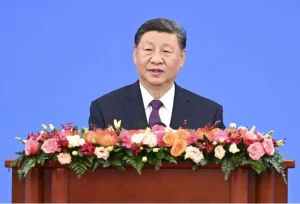Beijing, China
CHINESE President Xi Jinping emphasized global harmony through dialogue and cooperation in his recent address marking the 70th Anniversary of the Five Principles of Peaceful Coexistence. Originating in 1953, these principles, including non-aggression and mutual benefit, have shaped China’s diplomatic policy, fostering stability and cooperation globally.
Endorsed in joint statements with India and Myanmar in 1954, these principles have profoundly shaped global diplomacy and international relations. Xi emphasized China’s steadfast adherence to these principles, which guide its foreign policy. China advocates for sovereignty and territorial integrity, rejects hegemonism, and promotes peaceful dispute resolution. Initiatives like the China Pakistan Economic Corridor exemplify the principle of mutual benefit and highlight China’s role as a mediator and peacekeeper, fostering global stability and cooperation.
Xi announced several new initiatives to further support developing countries. These include establishing a Global South research center, offering scholarships and training opportunities, and launching a Global South youth leadership program. Additionally, he pledged continued support for agricultural development, reaffirming China’s commitment to fostering global growth and cooperation.
Xi criticized the hegemonic and aggressive policies of some Western powers, which have led to increased deficits in peace, development, security, and governance. He emphasized the enduring relevance of the Five Principles in today’s world, marked by rapid technological advancements and geopolitical tensions. Against this backdrop, these principles remain a beacon of hope for a just and equitable international order.
Xi called for a global commitment to mutual respect, fairness, and cooperation, emphasizing that all countries, regardless of size or wealth, should work together to achieve shared prosperity and lasting peace. The vision of building a community with a shared future for mankind, rooted in the Five Principles, underscores China’s resolve to contribute to global development and human progress.

Xi Jinping’s speech reinforced China’s leadership role in promoting peace, cooperation, and mutual benefit. The Five Principles of Peaceful Coexistence, which emerged in the post-World War II era, continue to serve as vital norms for fostering international relations. China’s approach towards Pakistan exemplifies its commitment to non-aggression and non-interference. The bilateral relations between China and Pakistan are characterized by mutual respect and sovereignty. China has consistently supported Pakistan on various international platforms, including its stance on Kashmir, without imposing its policies or interfering in Pakistan’s internal affairs.
The China-Pakistan Economic Corridor (CPEC), a flagship project under the Belt and Road Initiative (BRI), is a prime example of how China has operationalized the principles of equality and mutual benefit. Valued at $62 billion, CPEC aims to enhance infrastructure, energy production, and economic growth in Pakistan, while also benefiting China by providing a direct trade route to the Arabian Sea. Projects under CPEC have created thousands of jobs in Pakistan and contributed significantly to its GDP growth.
China and Pakistan have maintained a peaceful coexistence for decades, collaborating on security, defense, and regional stability. Joint military exercises and defense agreements have strengthened their strategic partnership, contributing to regional peace and stability.
Xi’s announcement of a Global South research center and scholarships highlights China’s dedication to supporting developing countries. These efforts are aimed at enhancing South-South cooperation and improving North-South relations. By offering training opportunities and launching youth leadership programs, China is investing in the future of global development. In Pakistan, educational initiatives under CPEC have led to the establishment of several vocational training institutes and scholarship programs for Pakistani students to study in China.
CPEC as part of the Belt and Road Initiative, continues to be a cornerstone of China-Pakistan relations. The infrastructure projects under CPEC, including road networks, railways, and the Gwadar Port, are designed to boost connectivity and trade. The Gwadar Port, in particular, is pivotal as it offers China direct access to the Arabian Sea, reducing maritime distance for Chinese exports.
China’s involvement in Pakistan’s energy sector has been transformative. From coal-fired power plants to renewable energy projects, Chinese investments are helping Pakistan overcome its energy crisis. The Quaid-e-Azam Solar Park in Punjab, one of the largest solar power plants in the world, is a testament to the scale of this collaboration.
The strategic partnership between China and Pakistan is underscored by strong security and defense cooperation. Joint military exercises, defense production collaborations, and intelligence sharing enhance regional security. The Pakistan-China Joint Committee on Cooperation has further institutionalized this partnership, ensuring ongoing dialogue and coordination. China’s role in mediating peace in Afghanistan, with Pakistan as a key partner, highlights its commitment to regional stability. China’s diplomatic efforts in facilitating dialogues among Afghan factions are aimed at ensuring a stable and peaceful neighborhood, benefiting both China and Pakistan.
Touting China as a force for peace, justice, and development, Xi also called for better communication and cooperation to counter “iron curtains of confrontation” amid rising tensions in the South China Sea and Beijing’s deepening rivalry with the US-led West.
Xi Jinping’s speech on peaceful coexistence not only underscores China’s commitment to the Five Principles but also highlights the practical implementation of these principles in its relationship with Pakistan. Through initiatives like CPEC, educational exchanges, and security cooperation, China and Pakistan exemplify a model of mutual respect, equality, and shared development. As the global landscape continues to evolve, the China-Pakistan partnership stands as a testament to the enduring relevance of the Five Principles in fostering a more just, peaceful, and prosperous world for all.










